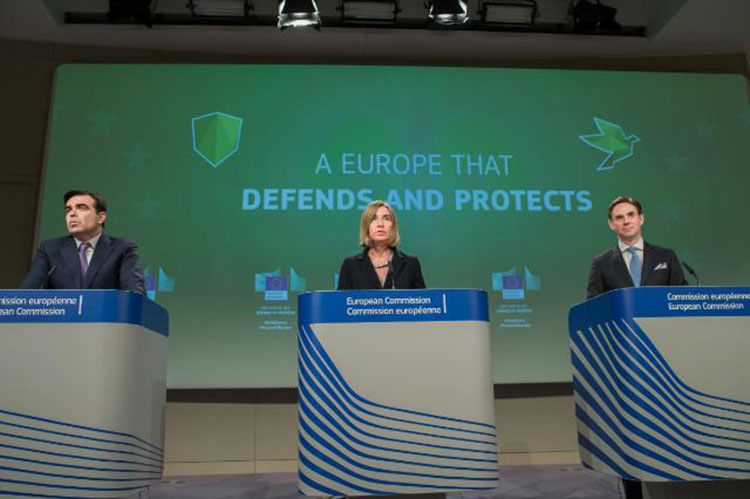The Commission is today opening a public debate on the future direction of defence in an EU of 27.
Following the Commission’s White Paper on the Future of Europe, today’s reflection paper outlines different scenarios on how to address the growing security and defence threats facing Europe and enhance Europe’s own abilities in defence by 2025. The debate will make an important contribution to deciding on how the Union will strengthen the protection and security of European citizens, which has been at the heart of the Juncker Commission priorities. The reflection paper is complemented by concrete proposals presented today to launch a European Defence Fund which will support more efficient spending by Member States on joint defence capabilities.
High Representative/Vice-President Federica Mogherini said: “We are moving fast and forward on security in the European Union, with the Commission accompanying and supporting the determination of Member States. Today’s Reflection Paper is the Commission’s contribution to the reflection on the future of our Union in this field, starting from the demand of a more integrated and effective defence coming from our citizens. Through the European Union, we can support Member States in developing military capabilities and investing more efficiently in defence. We have come a long way in less than one year and we are determined to keep this pace.”
Vice-President for Jobs, Growth, Investment and Competitiveness Jyrki Katainen added: “In today’s world, a strong NATO and a strong EU are more important than they ever have been before. Without duplicating what already exists, Europe needs to take its security and defence into its own hands in order to be a stronger partner to our allies. We know where we are headed and Member States are in the driving seat but it is time we decided how fast we want to get there.”
EU leaders will meet in Prague on 9 June to discuss how to use the potential of the Treaties for stepping up cooperation in defence. The Commission is contributing to that discussion and to the broader EU-wide debate on defence, by setting out three possible scenarios for the future of European defence.
- Under a “Security and Defence Cooperation” scenario, Member States would still decide on the need for security and defence cooperation on a voluntary and case-by-case basis, while the EU would continue to complement national efforts. Defence cooperation would be strengthened, but the EU’s participation in the most demanding operations would remain limited. The new European Defence Fund would help develop some new joint capabilities but Member States would still oversee the bulk of defence capabilities’ development and procurement individually. EU‒NATO cooperation would retain today’s format and structure.
- Under a more ambitious “Shared Security and Defence” scenario, Member States would pool together certain financial and operational assets to increase solidarity in defence. The EU would also become more engaged in Europe’s protection within and beyond its borders. It would take on a greater role in areas like cyber, border protection or the fight against terrorism, and strengthen the defence and security dimension of internal EU policies like energy, health, customs or space. This would be matched by a political will to act, as well as decision-making fit for a rapidly changing context. The EU and NATO would also increase mutual cooperation and coordinate across a full spectrum of issues.
- The most ambitious “Common Defence and Security” scenario foresees the progressive framing of a common Union defence policy, leading to common defence based on Article 42 of the EU Treaty. The existing provision allows a group of Member States to take European defence to the next level. Under this scenario, protecting Europe would become a mutually reinforcing responsibility of the EU and NATO. The EU would be able to run high-end security and defence operations, underpinned by a greater level of integration of Member States’ defence forces. The EU would support joint defence programmes with the European Defence Fund, as well as set up a dedicated European Defence Research Agency.This would also foster the creation of a genuine European defence market, able to protect its key strategic activities from external takeovers.
These above scenarios are not mutually exclusive, but illustrate three different levels of ambition in terms of solidarity. Enhancing European security is a must. Member States will be in the driving seat, defining the level of ambition with the support of the EU institutions. Looking to the future, they must now decide the path they want to take and speed they want to go at to protect Europe’s citizens.



